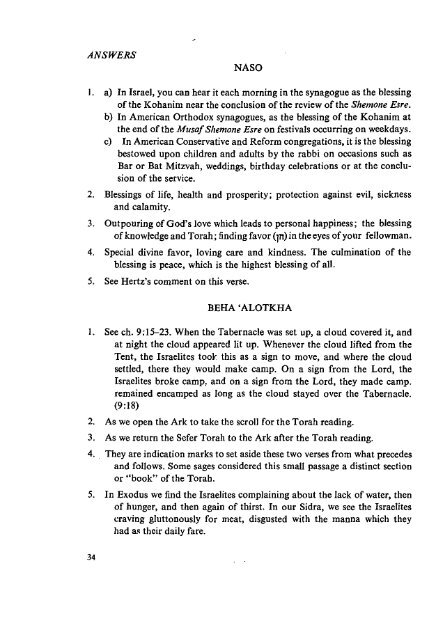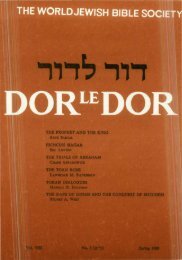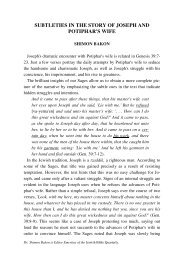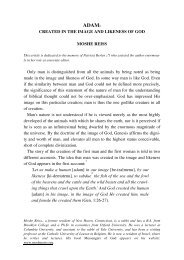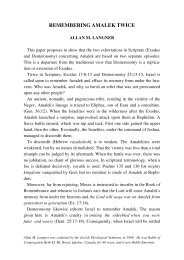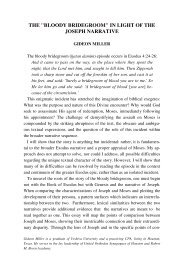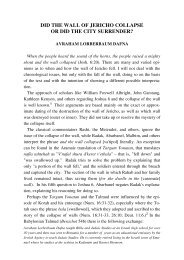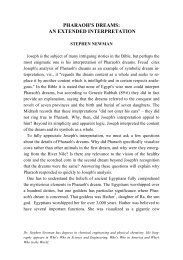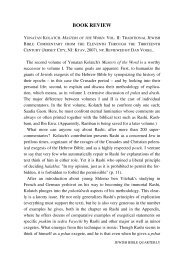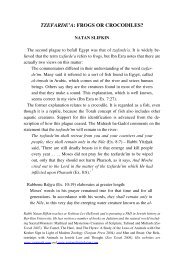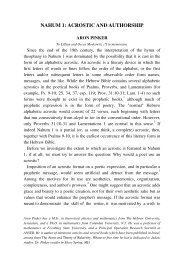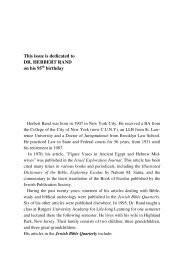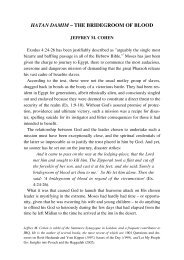ELUAH IN YIDDISH LITERATURE - Jewish Bible Quarterly
ELUAH IN YIDDISH LITERATURE - Jewish Bible Quarterly
ELUAH IN YIDDISH LITERATURE - Jewish Bible Quarterly
Create successful ePaper yourself
Turn your PDF publications into a flip-book with our unique Google optimized e-Paper software.
ANSWERS<br />
NASO<br />
I. a) In Israel, you can hear it each morning in the synagogue as the blessing<br />
of the Kohanim near the conclusion of the review of the Shemone Esre.<br />
b) In American Orthodox synagogues, as the blessing of the Kohanim at<br />
the end of the Musaf Shemone Esre on festivals occurring on weekdays.<br />
c) In American Conservative and Reform congregations, it is the blessing<br />
bestowed upon children and adults by the rabbi on occasions such as<br />
Bar or Bat Mitzvah, weddings, birthday celebrations or at the conclusion<br />
of the service.<br />
2. Blessings of life, health and prosperity; protection against evil, sickness<br />
and calamity.<br />
3. Outpouring of God's Jove which leads to personal happiness; the blessing<br />
of knowledge and Torah; finding favor (Jn) in the eyes of your fellowman.<br />
4. Special divine favor, loving care and kindness. The culmination of the<br />
blessing is peace, which is the highest blessing of all.<br />
5. See Hertz's comment on this verse.<br />
BEHA 'ALOTKHA<br />
I. See ch. 9:15-23. When the Tabernacle was set up, a cloud covered it, and<br />
at night the cloud appeared lit up. Whenever the cloud lifted from the<br />
Tent, the Israelites took this as a sign to move, and where the cloud<br />
settled, there they would make camp. On a sign from the Lord, the<br />
Israelites broke camp, and on a sign from the Lord, they made camp.<br />
remained encamped as long as the cloud stayed over the Tabernacle.<br />
(9:18)<br />
2. As we open the Ark to take the scroll for the Torah reading.<br />
3. As we return the Sefer Torah to the Ark after the Torah reading.<br />
4. They are indication marks to set aside these two verses from what precedes<br />
and follows. Some sages considered this small passage a distinct section<br />
or "book" of the Torah.<br />
5. In Exodus we find the Israelites complaining about the lack of water, then<br />
of hunger, and then again of thirst. In our Sidra, we see the Israelites<br />
craving gluttonously for meat, disgusted with the manna which they<br />
had a< their daily fare.<br />
34


